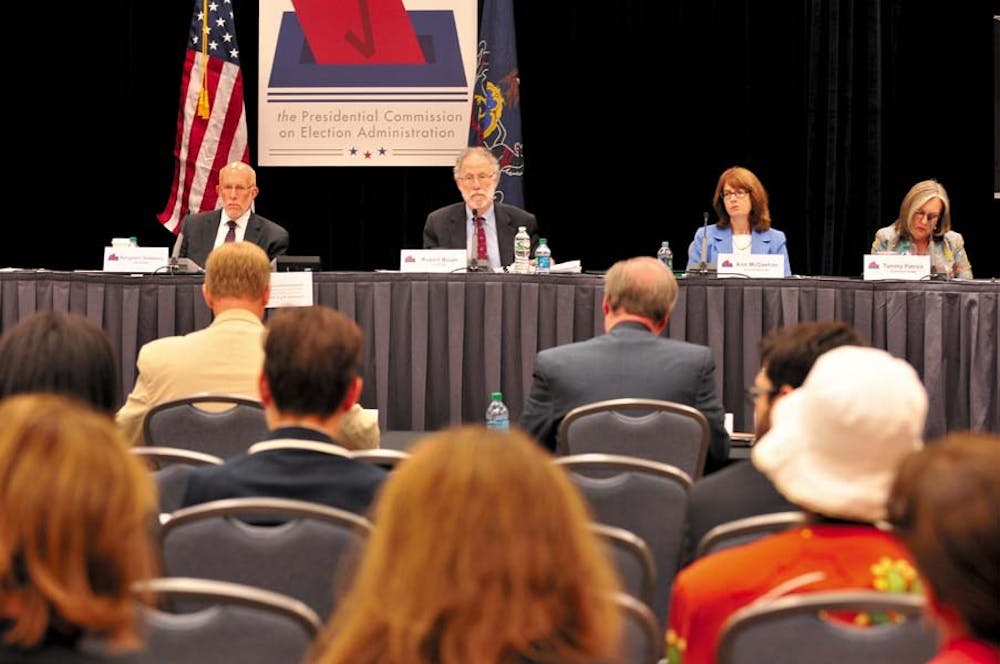
Amid the backdrop of a looming local election season, the Presidential Commission on Election Administration met in Center City to discuss how to improve current election policies.
The commission, which is co-chaired by 1974 College graduate Benjamin Ginsberg and was established in March, held a public hearing on Wednesday at the Philadelphia Convention Center, at which directors of state election bodies from the east coast testified about their home state’s electoral practices.
Speakers at the PCEA meeting discussed a range of issues, from methods of preparing for a natural disaster to the use of electronic voting systems. However, voter identification issues, specifically Pennsylvania’s controversial voter ID law, were not on the day’s agenda, as they were beyond the scope of the commission’s purpose.
Most of the discussion during Wednesday’s first panel of election officials focused on the use of technology in elections.
Related: Voter ID laws applied unequally, study shows
Elaine Manlove, Delaware’s election commissioner, talked about the benefits of the state’s electronic signature system, which she said allows officials to more easily search for a person’s registration records if issues arise on Election Day.
She also noted that Delaware’s use of 16 and 17-year-old poll workers allows them to stay on top of the tech curve, as the young employees are “not afraid of technology.”
Secretary of Virginia’s State Board of Elections Donald Palmer discussed how problems with Virginia’s antiquated election machines have led to longer wait times.
“Most election officials … have not been able to upgrade their election equipment,” Palmer said. “The current process intensive and time consuming.”
Related: Trial to decide fate of controversial voter ID law begins
At the second panel, representatives from New York, New Jersey and Louisiana discussed methods for preparing election precincts for natural disasters, such as Hurricane Sandy, which devastated the east coast last year and threatened to postpone elections in certain states.
One message which all officials keyed in on was the importance of reaching out to necessary agencies, such as electric companies, immediately.
Related: Political Action Week brings election events to campus
“Don’t wait [for them to call you] — reach out to them,” said Todd Valentine, co-executive director of New York State’s Board of Elections.
Ginsberg noted that although election practices vary across states, these meetings allow for the commission to come together and hear various experiences.
“I think one of the things you see around the country are inconsistencies in the way best practices are enacted,” PCEA Co-chair Ginsberg said in an interview with the Daily Pennsylvanian.
One topic that was not heavily discussed at the morning portion of PCEA’s hearings was provisional balloting, which was problem many Penn students faced in the 2012 presidential election.
While Ginsberg, a former DP Editor in Chief, noted that provisional balloting has been more prevalent in some states than others, he said that “it has not really been an issue that has irritated a lot of people, but where there are a lot of provisional ballots, it seems to be a symptom of another issue.”
He noted in particular that flawed poll books and miswritten forms could contribute to errors that lead to provisional balloting. However, he said that issues pertaining to provisional balloting will be further discussed at a meeting in Cincinnati later this September.
The Daily Pennsylvanian is an independent, student-run newspaper. Please consider making a donation to support the coverage that shapes the University. Your generosity ensures a future of strong journalism at Penn.
DonatePlease note All comments are eligible for publication in The Daily Pennsylvanian.




